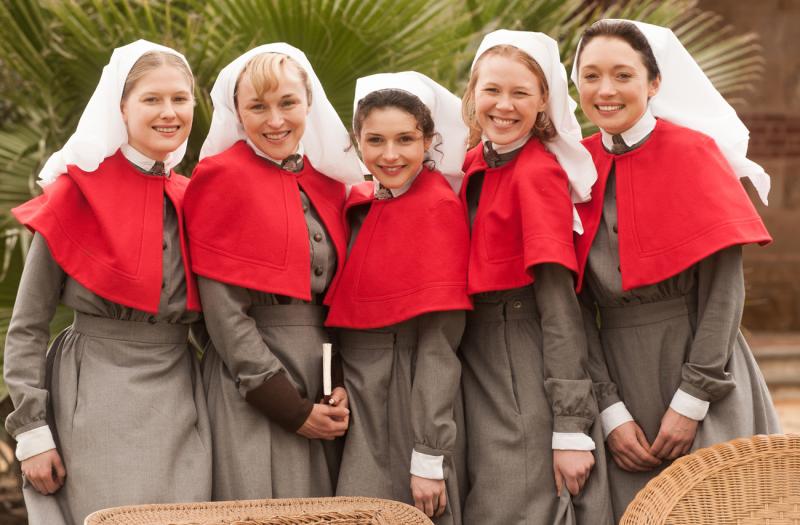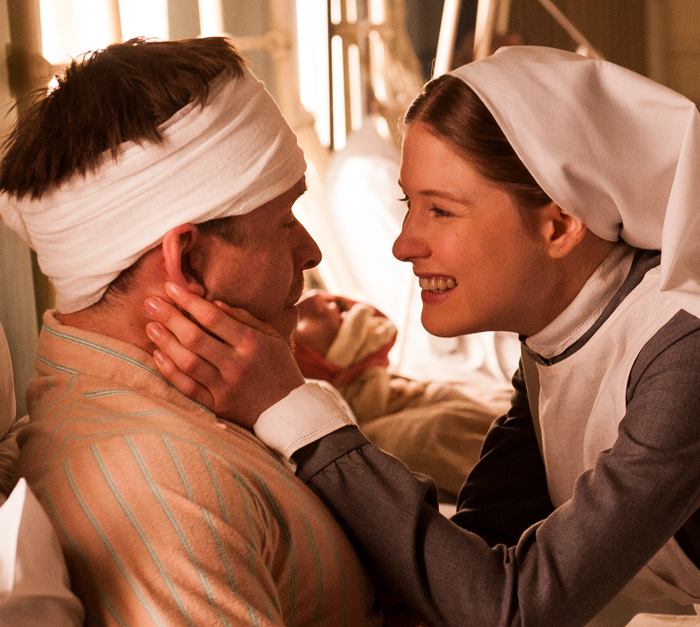Anzac Girls, More4 | reviews, news & interviews
Anzac Girls, More4
Anzac Girls, More4
Australian nurses-at-war drama lacks gravitas (and a decent budget)

For Australians and New Zealanders, the grim meat-grinder of the Gallipoli campaign in 1915 was their equivalent of the Somme, albeit under brilliant Aegean skies. The Australian-made Anzac Girls is based on real-life diaries and letters from the era, and homes in on five nurses from Down Under who were sent to treat the casualties. Inevitably they found conditions far more shocking and horrific than they'd imagined.
However, as the BBC discovered with its own nurses-at-war yarn The Crimson Field, this fraught and poignant environment may theoretically sound like a goldmine for drama, but it's difficult to make it function convincingly on the screen. As we see again here, the problem is that the set-up keeps veering towards soap and melodrama, though perhaps it would be less likely to if the casting director hadn't recruited what look more like models or a dance troupe than dedicated medical professionals. Laura Brent, playing Sister Elsie Cook, could be Aussie hot-to-go girl Margot Robbie's sister, while Georgia Flood (playing Alice Ross King) approaches the Great War with the flirty exuberance of a cheerleader at the Big Bash twenty20 cricket tournament.
The girls are well matched by the soldiery, who all seem to be chiselled young men with serious chart potential, led by officers who are firm of jaw and twinkling of eye. For much of this opening episode, Anzac Girls was The Dating Game, as Alice enjoyed sightseeing trips to the Pyramids with the eager Lieutenant Smith, then later found herself being seduced by the poetry of Omar Khayyam as recited by Lieutenant Harry Moffitt. Meanwhile Elsie managed to slip away from the beady invigilation of Matron Wilson to have it off with her husband Syd in his army tent (she'd had to keep her marital status secret because nurses were only permitted to be widowed or single).
 Also injurious to credibility is the parsimonious budget, dictating that depictions of warfare are restricted to distant flashes and bangs and glimpses of fuzzy CGI warships. Hence, you feel you're being given this alternative behind-the-scenes view of the war because they couldn't afford to take the viewer out there onto the beaches and into the trenches.
Also injurious to credibility is the parsimonious budget, dictating that depictions of warfare are restricted to distant flashes and bangs and glimpses of fuzzy CGI warships. Hence, you feel you're being given this alternative behind-the-scenes view of the war because they couldn't afford to take the viewer out there onto the beaches and into the trenches.
Long story short, I couldn't take this very seriously, although at least Lt Moffitt gave us a potted summary of why the Gallipoli campaign mattered to Australia. It was a chance for a young country to stand up and punch its weight in the world, and come out from under Britain's shadow. A bigger theme for a bigger programme, perhaps.
The future of Arts Journalism
You can stop theartsdesk.com closing!
We urgently need financing to survive. Our fundraising drive has thus far raised £49,000 but we need to reach £100,000 or we will be forced to close. Please contribute here: https://gofund.me/c3f6033d
And if you can forward this information to anyone who might assist, we’d be grateful.

Subscribe to theartsdesk.com
Thank you for continuing to read our work on theartsdesk.com. For unlimited access to every article in its entirety, including our archive of more than 15,000 pieces, we're asking for £5 per month or £40 per year. We feel it's a very good deal, and hope you do too.
To take a subscription now simply click here.
And if you're looking for that extra gift for a friend or family member, why not treat them to a theartsdesk.com gift subscription?
more TV
 Down Cemetery Road, Apple TV review - wit, grit and a twisty plot, plus Emma Thompson on top form
Mick Herron's female private investigator gets a stellar adaptation
Down Cemetery Road, Apple TV review - wit, grit and a twisty plot, plus Emma Thompson on top form
Mick Herron's female private investigator gets a stellar adaptation
 theartsdesk Q&A: director Stefano Sollima on the relevance of true crime story 'The Monster of Florence'
The director of hit TV series 'Gomorrah' examines another dark dimension of Italian culture
theartsdesk Q&A: director Stefano Sollima on the relevance of true crime story 'The Monster of Florence'
The director of hit TV series 'Gomorrah' examines another dark dimension of Italian culture
 The Monster of Florence, Netflix review - dramatisation of notorious Italian serial killer mystery
Director Stefano Sollima's four-parter makes gruelling viewing
The Monster of Florence, Netflix review - dramatisation of notorious Italian serial killer mystery
Director Stefano Sollima's four-parter makes gruelling viewing
 The Diplomat, Season 3, Netflix review - Ambassador Kate Wyler becomes America's Second Lady
Soapy transatlantic political drama keeps the Special Relationship alive
The Diplomat, Season 3, Netflix review - Ambassador Kate Wyler becomes America's Second Lady
Soapy transatlantic political drama keeps the Special Relationship alive
 The Perfect Neighbor, Netflix review - Florida found-footage documentary is a harrowing watch
Sundance winner chronicles a death that should have been prevented
The Perfect Neighbor, Netflix review - Florida found-footage documentary is a harrowing watch
Sundance winner chronicles a death that should have been prevented
 Murder Before Evensong, Acorn TV review - death comes to the picturesque village of Champton
The Rev Richard Coles's sleuthing cleric hits the screen
Murder Before Evensong, Acorn TV review - death comes to the picturesque village of Champton
The Rev Richard Coles's sleuthing cleric hits the screen
 Black Rabbit, Netflix review - grime and punishment in New York City
Jude Law and Jason Bateman tread the thin line between love and hate
Black Rabbit, Netflix review - grime and punishment in New York City
Jude Law and Jason Bateman tread the thin line between love and hate
 The Hack, ITV review - plodding anatomy of twin UK scandals
Jack Thorne's skill can't disguise the bagginess of his double-headed material
The Hack, ITV review - plodding anatomy of twin UK scandals
Jack Thorne's skill can't disguise the bagginess of his double-headed material
 Slow Horses, Series 5, Apple TV+ review - terror, trauma and impeccable comic timing
Jackson Lamb's band of MI5 misfits continues to fascinate and amuse
Slow Horses, Series 5, Apple TV+ review - terror, trauma and impeccable comic timing
Jackson Lamb's band of MI5 misfits continues to fascinate and amuse
 Coldwater, ITV1 review - horror and black comedy in the Highlands
Superb cast lights up David Ireland's cunning thriller
Coldwater, ITV1 review - horror and black comedy in the Highlands
Superb cast lights up David Ireland's cunning thriller
 Blu-ray: The Sweeney - Series One
Influential and entertaining 1970s police drama, handsomely restored
Blu-ray: The Sweeney - Series One
Influential and entertaining 1970s police drama, handsomely restored
 I Fought the Law, ITVX review - how an 800-year-old law was challenged and changed
Sheridan Smith's raw performance dominates ITV's new docudrama about injustice
I Fought the Law, ITVX review - how an 800-year-old law was challenged and changed
Sheridan Smith's raw performance dominates ITV's new docudrama about injustice

Add comment